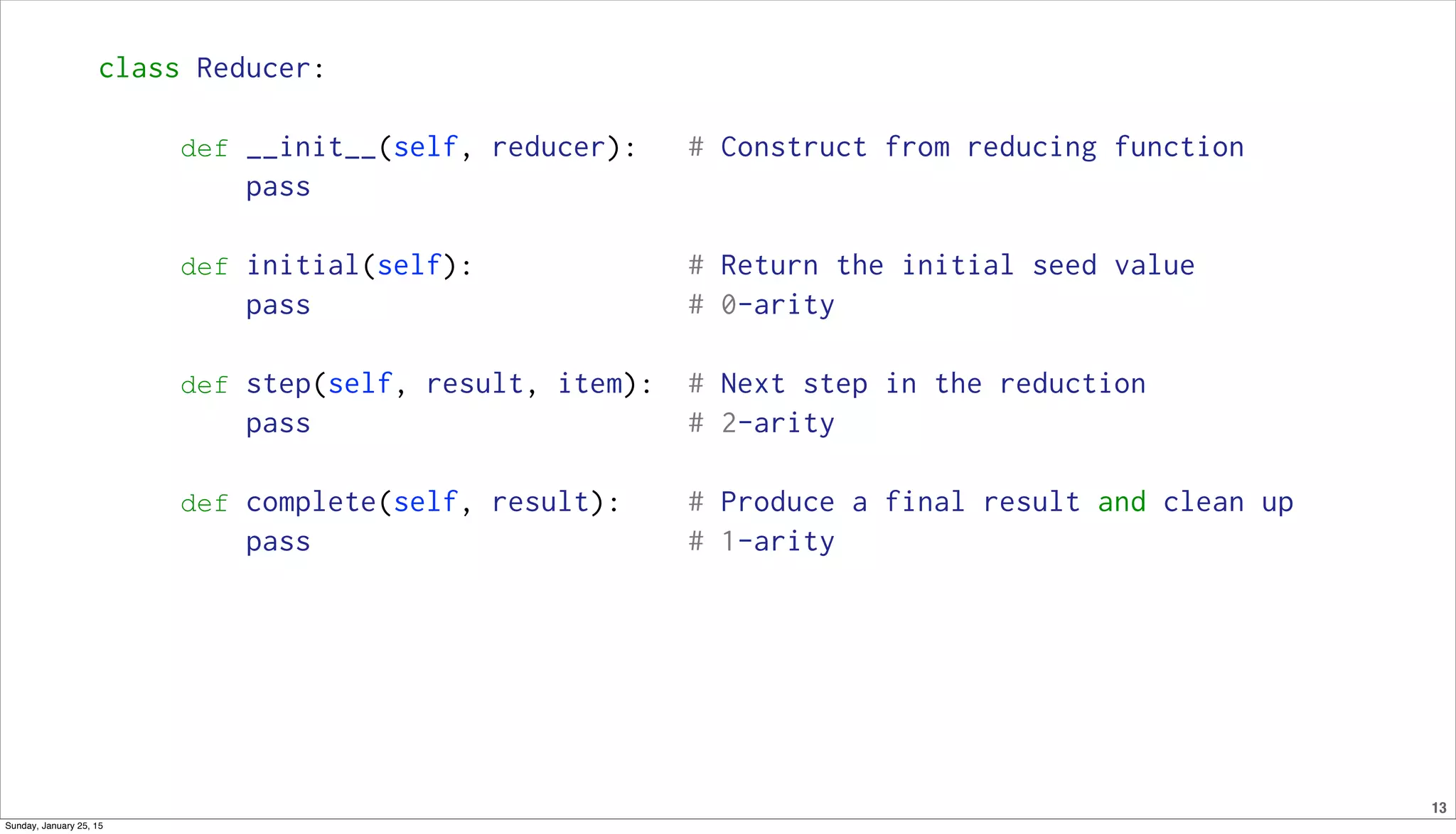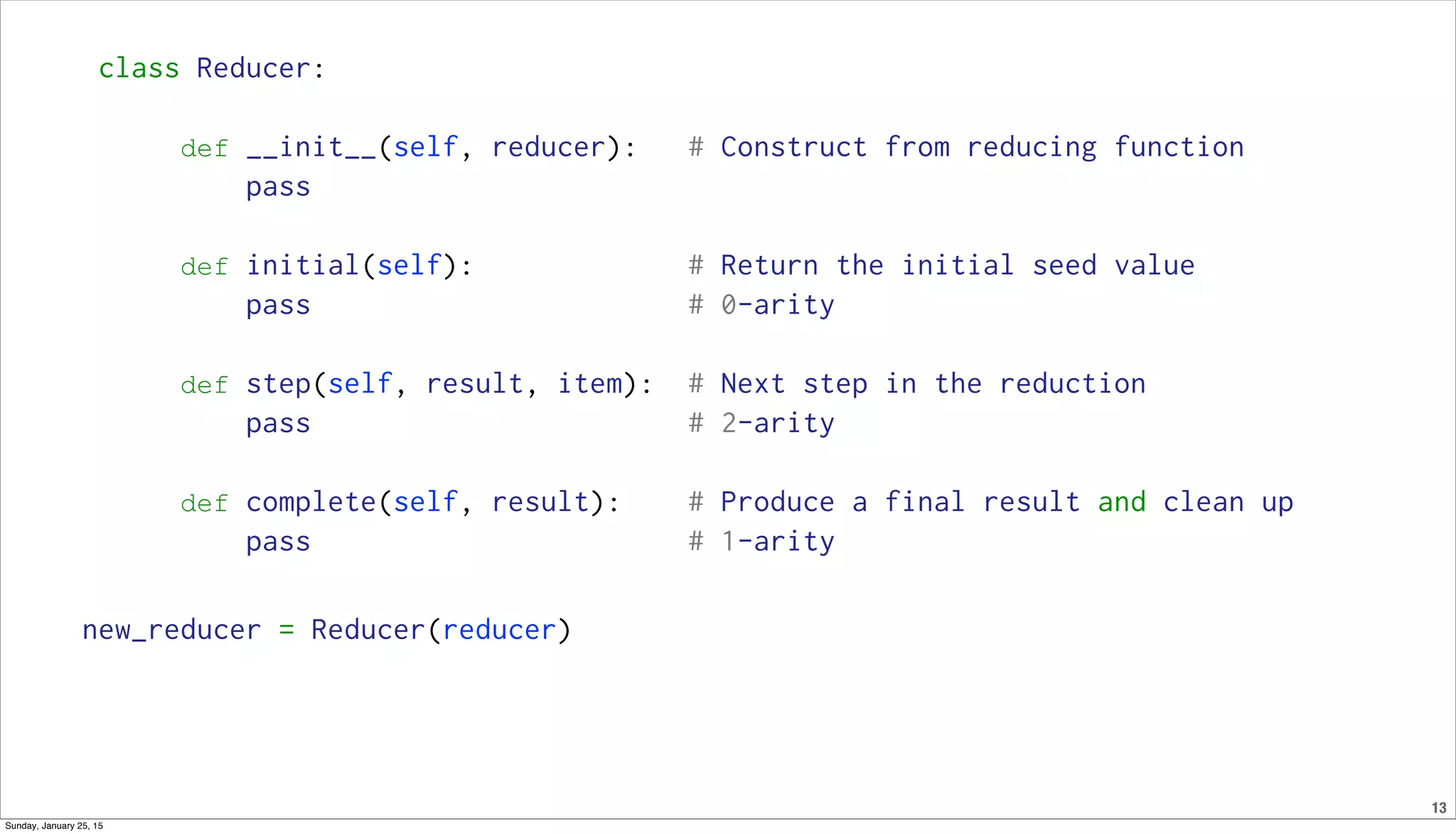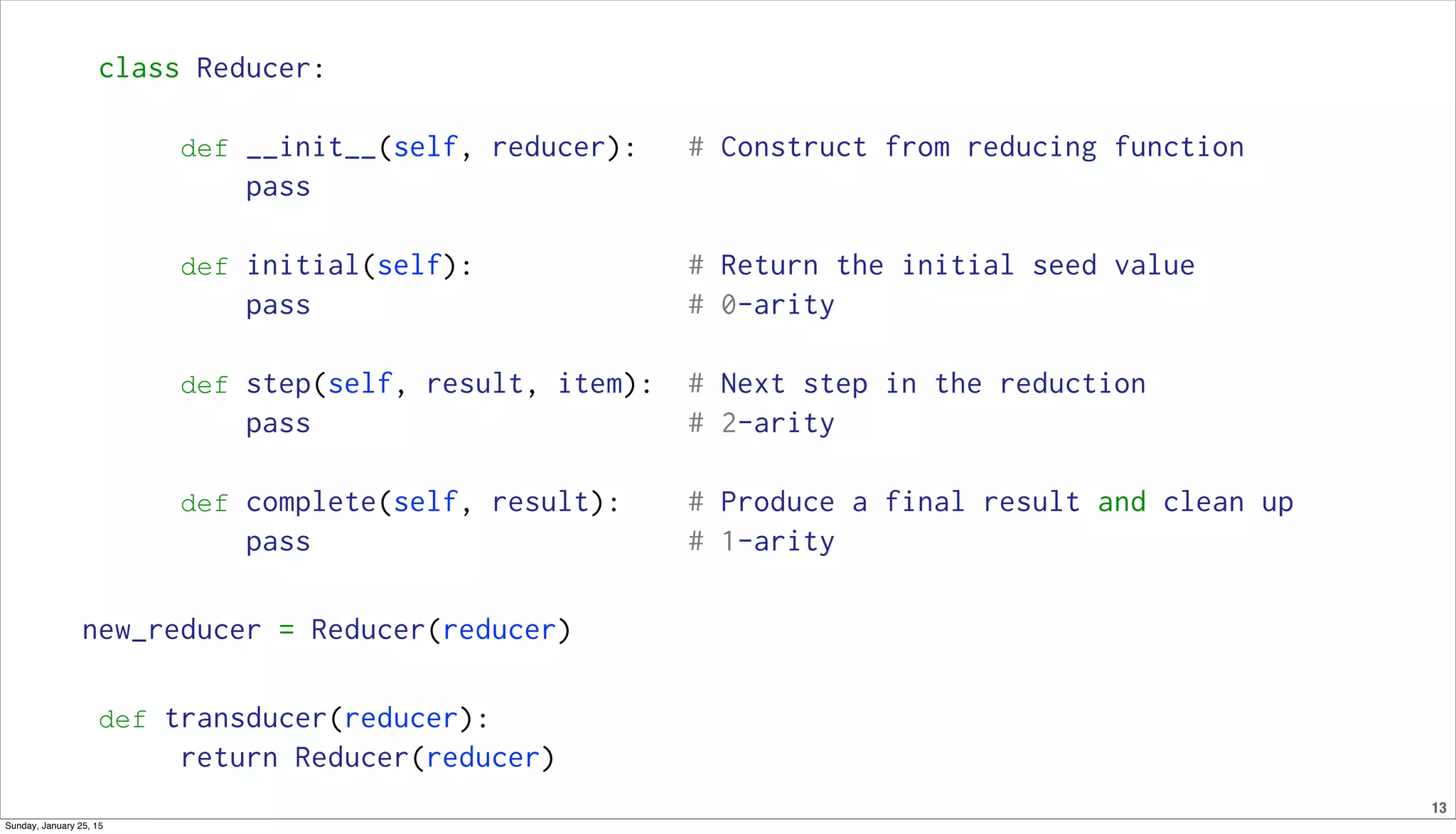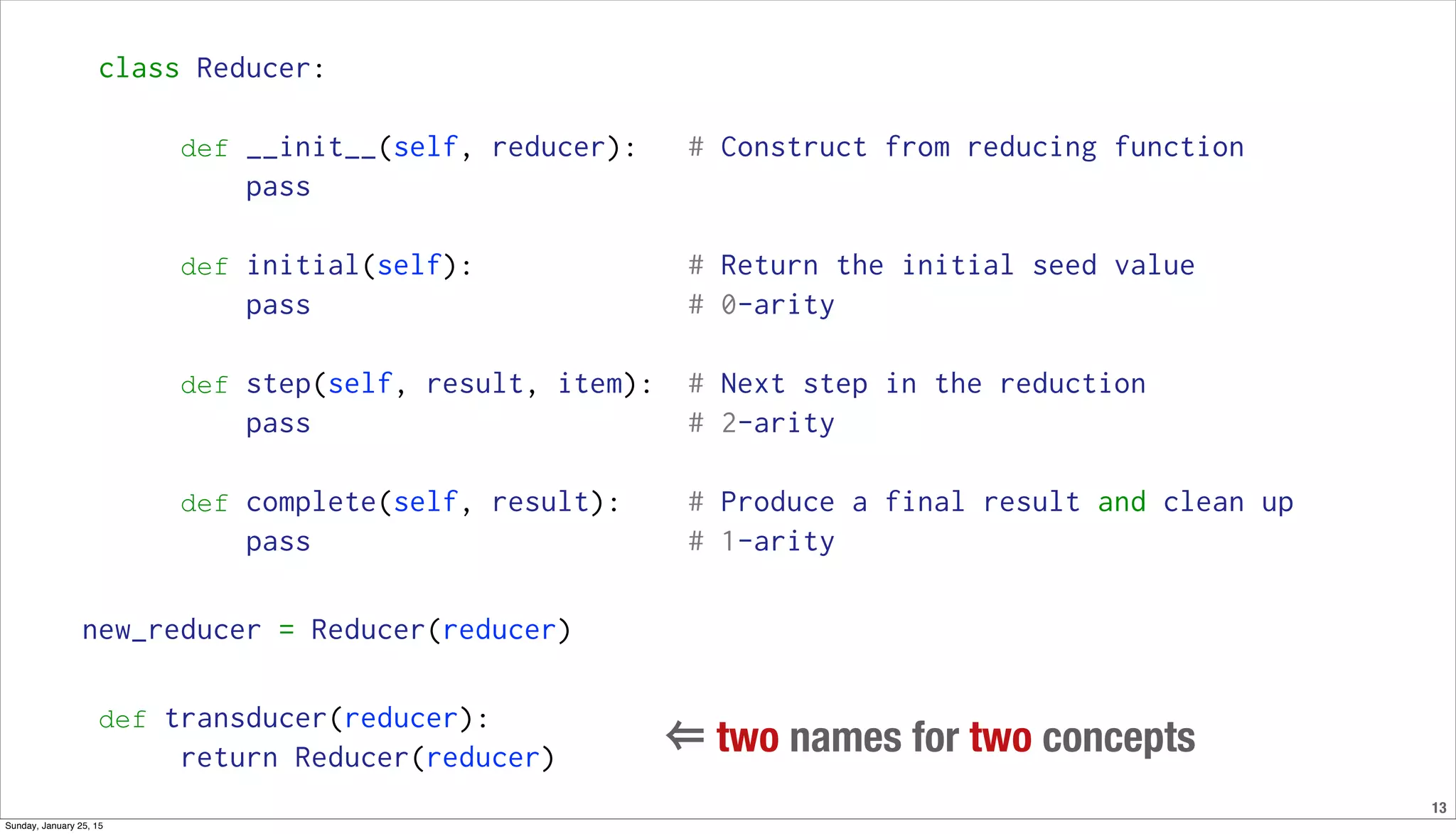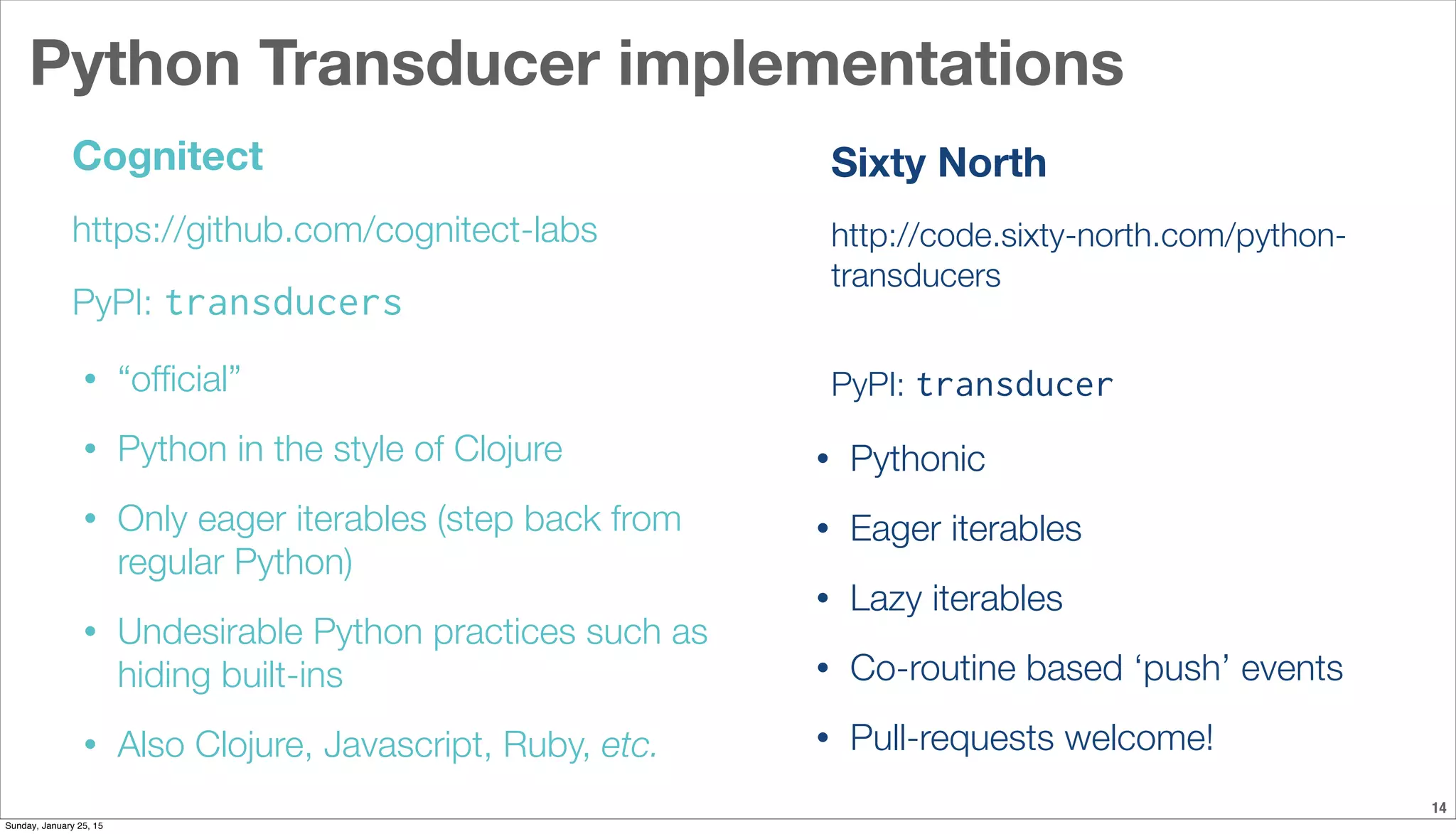The document discusses transducers, which are functions that transform reducers, highlighting their implementation in Python as a functional programming technique influenced by Clojure. It provides examples of custom map and filter functions in Python, contrasts their operation with Clojure's approach, and outlines the requirements for fully implementing Clojure-like transducers in Python. Additionally, it introduces two Python libraries for transducer implementations: one in the style of Clojure and another more Pythonic version.


![Functions which transform reducers
What is a transducer?
‣ Reducer (reducing function)
• Any function we can pass to reduce(reducer, iterable[, initial])
• (result, input) → result
• add(result, input)
reduce(add, [1, 2, 3], 0) → 6
‣ Transducer (transform reducer)
• A function which accepts a reducer, and transforms it in some way, and returns a
new reducer
• ((result, input) → result) → ((result, input) → result)
3
Sunday, January 25, 15](https://image.slidesharecdn.com/austinbinghamtransducersinpython-150210001145-conversion-gate02/75/Austin-Bingham-Transducers-in-Python-PyCon-Belarus-3-2048.jpg)
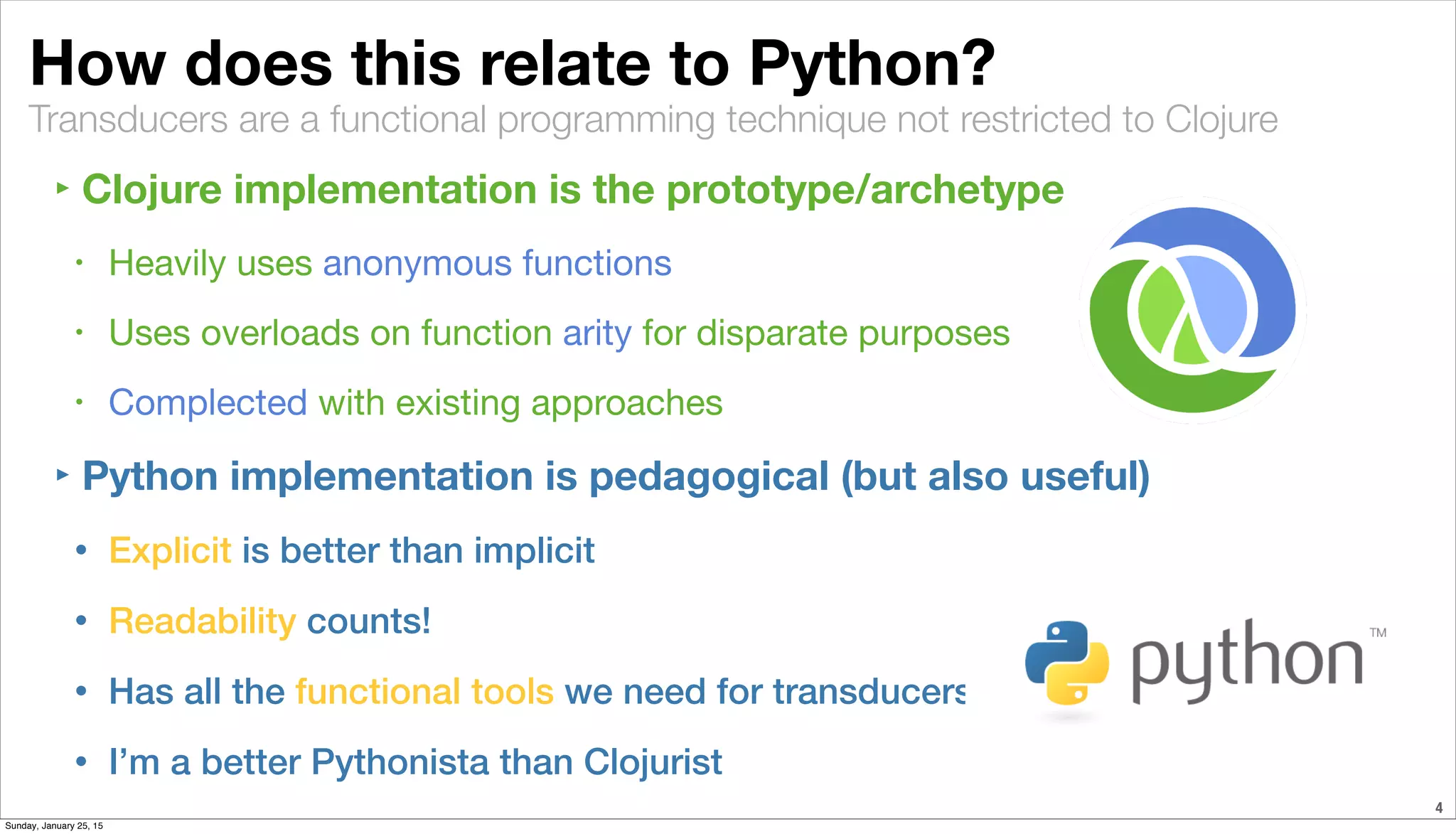

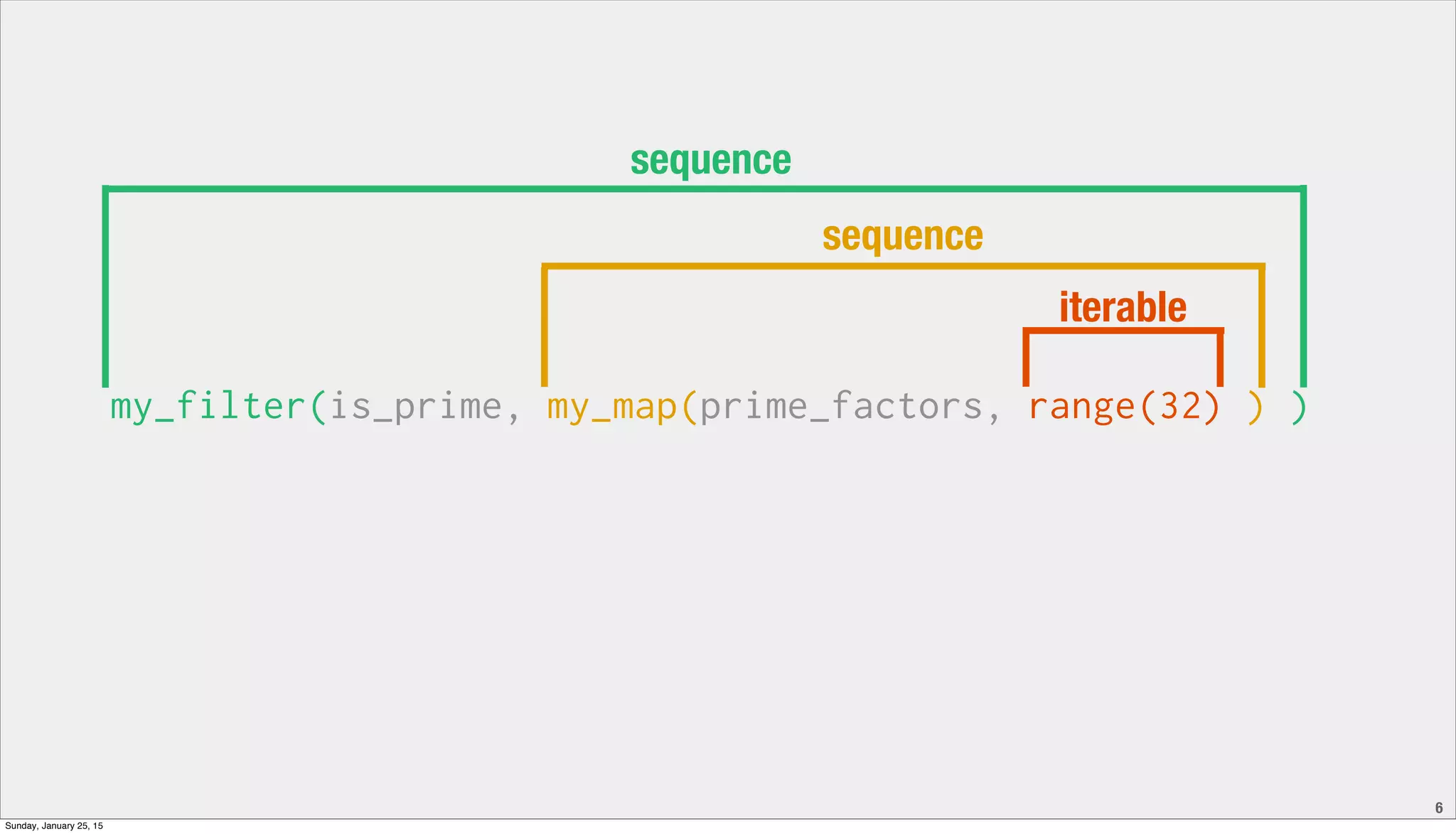
![7
def my_map(transform, iterable):
def map_reducer(sequence, item):
sequence.append(transform(item))
return sequence
return reduce(map_reducer, iterable, [])
def my_filter(predicate, iterable):
def filter_reducer(sequence, item):
if predicate(item):
sequence.append(item)
return sequence
return reduce(filter_reducer, iterable, [])
Sunday, January 25, 15](https://image.slidesharecdn.com/austinbinghamtransducersinpython-150210001145-conversion-gate02/75/Austin-Bingham-Transducers-in-Python-PyCon-Belarus-7-2048.jpg)
![7
def my_map(transform, iterable):
def map_reducer(sequence, item):
sequence.append(transform(item))
return sequence
return reduce(map_reducer, iterable, [])
def my_filter(predicate, iterable):
def filter_reducer(sequence, item):
if predicate(item):
sequence.append(item)
return sequence
return reduce(filter_reducer, iterable, [])
reduce()
Sunday, January 25, 15](https://image.slidesharecdn.com/austinbinghamtransducersinpython-150210001145-conversion-gate02/75/Austin-Bingham-Transducers-in-Python-PyCon-Belarus-8-2048.jpg)
![7
def my_map(transform, iterable):
def map_reducer(sequence, item):
sequence.append(transform(item))
return sequence
return reduce(map_reducer, iterable, [])
def my_filter(predicate, iterable):
def filter_reducer(sequence, item):
if predicate(item):
sequence.append(item)
return sequence
return reduce(filter_reducer, iterable, [])
reduce()
sequence.append()
Sunday, January 25, 15](https://image.slidesharecdn.com/austinbinghamtransducersinpython-150210001145-conversion-gate02/75/Austin-Bingham-Transducers-in-Python-PyCon-Belarus-9-2048.jpg)
![7
def my_map(transform, iterable):
def map_reducer(sequence, item):
sequence.append(transform(item))
return sequence
return reduce(map_reducer, iterable, [])
def my_filter(predicate, iterable):
def filter_reducer(sequence, item):
if predicate(item):
sequence.append(item)
return sequence
return reduce(filter_reducer, iterable, [])
reduce()
sequence.append()
Empty list : ‘seed’
must be a mutable
sequence
Sunday, January 25, 15](https://image.slidesharecdn.com/austinbinghamtransducersinpython-150210001145-conversion-gate02/75/Austin-Bingham-Transducers-in-Python-PyCon-Belarus-10-2048.jpg)
![8
>>> reduce(make_mapper(square), range(10), [])
[0, 1, 4, 9, 16, 25, 36, 49, 64, 81]
>>> reduce(make_filterer(is_prime), range(100), [])
[2, 3, 5, 7, 11, 13, 17, 19, 23, 29, 31, 37, 41, 43, 47, 53, 59, 61,
67, 71, 73, 79, 83, 89, 97]
‣ make_mapper() and make_filterer() are not composable
‣ to square primes we would need to call reduce() twice
‣ this requires we store the intermediate sequence
‣ the reducers returned by make_mapper() and make_filterer()
depend on the seed being a mutable sequence e.g. a list
Sunday, January 25, 15](https://image.slidesharecdn.com/austinbinghamtransducersinpython-150210001145-conversion-gate02/75/Austin-Bingham-Transducers-in-Python-PyCon-Belarus-11-2048.jpg)
![9
(defn map
([f]
(fn [rf]
(fn
([] (rf))
([result] (rf result))
([result input]
(rf result (f input)))
([result input & inputs]
(rf result (apply f input inputs))))))
Sunday, January 25, 15](https://image.slidesharecdn.com/austinbinghamtransducersinpython-150210001145-conversion-gate02/75/Austin-Bingham-Transducers-in-Python-PyCon-Belarus-12-2048.jpg)
![10
(defn map ;; The tranducer factory...
([f] ;; ...accepts a single argument 'f', the transforming function
(fn [rf] ;; The transducer function accepts a reducing function 'rf'
(fn ;; This is the reducing function returned by the transducer
([] (rf)) ;; 0-arity : Forward to the zero-arity reducing function 'rf'
([result] (rf result)) ;; 1-arity : Forward to the one-arity reducing function 'rf'
([result input] ;; 2-arity : Perform the reduction with one arg to 'f'
(rf result (f input)))
([result input & inputs] ;; n-arity : Perform the reduction with multiple args to 'f'
(rf result (apply f input inputs))))))
Sunday, January 25, 15](https://image.slidesharecdn.com/austinbinghamtransducersinpython-150210001145-conversion-gate02/75/Austin-Bingham-Transducers-in-Python-PyCon-Belarus-13-2048.jpg)
![11
(defn map ;; The tranducer factory...
([f] ;; ...accepts a single argument 'f', the transforming function
(fn [rf] ;; The transducer function accepts a reducing function 'rf'
(fn ;; This is the reducing function returned by the transducer
([] (rf)) ;; 0-arity : Return a 'seed' value obtained from 'rf'
([result] (rf result)) ;; 1-arity : Obtain final result from 'rf' and clean-up
([result input] ;; 2-arity : Perform the reduction with one arg to 'f'
(rf result (f input)))
([result input & inputs] ;; n-arity : Perform the reduction with multiple args to 'f'
(rf result (apply f input inputs))))))
Sunday, January 25, 15](https://image.slidesharecdn.com/austinbinghamtransducersinpython-150210001145-conversion-gate02/75/Austin-Bingham-Transducers-in-Python-PyCon-Belarus-14-2048.jpg)
![12
(defn map ;; The tranducer factory...
([f] ;; ...accepts a single argument 'f', the transforming function
(fn [rf] ;; The transducer function accepts a reducing function 'rf'
(fn ;; This is the reducing function returned by the transducer
([] (rf)) ;; 0-arity : Return a 'seed' value obtained from 'rf'
([result] (rf result)) ;; 1-arity : Obtain final result from 'rf' and clean-up
([result input] ;; 2-arity : Perform the reduction with one arg to 'f'
(rf result (f input)))
([result input & inputs] ;; n-arity : Perform the reduction with multiple args to 'f'
(rf result (apply f input inputs))))))
To fully implement Clojure’s transducers in Python we also need:
‣ explicit association of the seed value with the reduction operation
‣ support for early termination without reducing the whole series
‣ reduction to a final value and opportunity to clean up state
Sunday, January 25, 15](https://image.slidesharecdn.com/austinbinghamtransducersinpython-150210001145-conversion-gate02/75/Austin-Bingham-Transducers-in-Python-PyCon-Belarus-15-2048.jpg)
